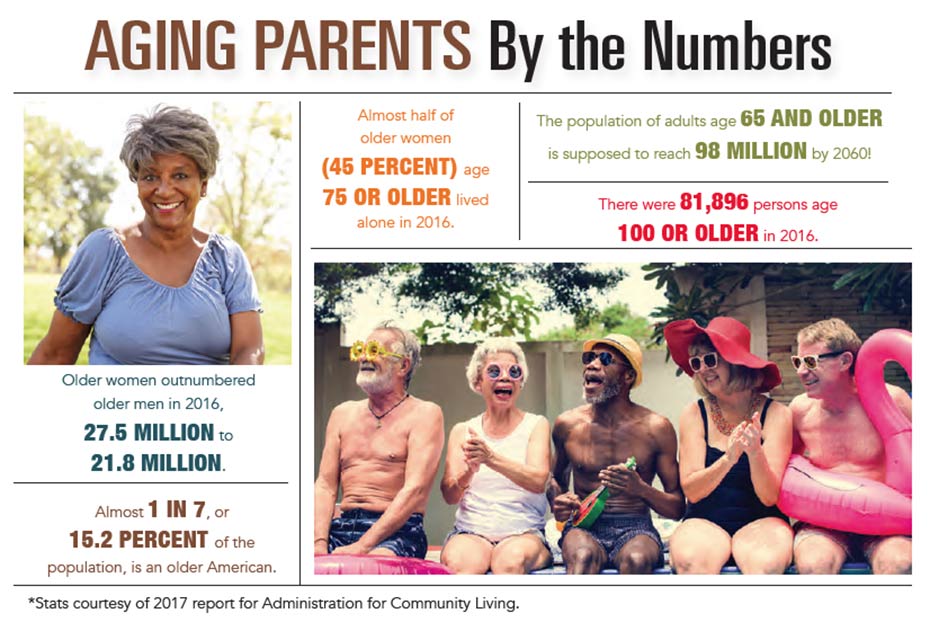We all want to give our parents or any close older relatives a fulfilling and comfortable experience as they move through the later years of life. But sometimes challenges crop up and make us question exactly how to handle that task. Instead of waiting until the moment families are faced with something difficult and caught woefully without a plan, experts suggest having solid arrangements in place for brighter golden years. After all, everyone’s wellness is at stake, including yours as the potential caregiver.
Alyson Fudge, attorney with Lowcountry Law Office, explained that adults with aging parents should absolutely look into preparing the power of attorney documents before loved ones become incapacitated and unable to sign such documents.
“Just like insurance with your home, you would not wait until there’s a fire,” she cautioned, adding that “incapacitated” means unable to make important decisions and has nothing to do with whether the loved one still manages to carry on with daily chat.
Power of attorney documents are divided into two types: financial, which also includes real estate, and medical. This is the minimum number of necessary documents, according to Fudge, and should be in place long before a problem arises. And while it might be tempting to pull up a website and try to fill out the power of attorney forms yourself – or turn to your attorney buddy who specializes in another type of law – Fudge advised that seeking proper legal guidance is well worth it in the long run.
“If you wait until it’s too late, actions could be initiated by a nursing home or hospital, and at that point the family is considered to be negligent,” she pointed out.
According to both Fudge and Kitty Weaver, a nurse with LTC Health Solutions, those crucial moments of planning with the senior, plus any other adults involved in making decisions, such as siblings, can save a vast number of headaches and challenges down the road.
“If they become ill, what are their goals and preferences? The worst case scenario is getting blindsided by a tragic event and not knowing. Having to make decisions with other family members causes stress,” Weaver said.
“You have to solve legal and financial issues first – the rest is social work,” Fudge explained.
So once the legal and financial documents are in place, what about other advice for adults to consider as loved ones get older? According to Weaver, it’s important to keep up with their quality of life and check in regularly. This can mean anything from riding in the car with mom and dad and evaluating their driving skills to inspecting the home regularly for cleanliness and upkeep. Medications, as well, should be consistently revisited to make sure they are still providing more help than harm.
“Things change, and meds should be evaluated at least every three months,” Weaver said. “Polypharmacy, a term for taking multiple pharmaceuticals, is common with seniors. Why continue to give them a medication that is no longer effective?”
Safety is also an important factor, and discovering hazards such as a stove left on or an unlocked door – particularly if this marks a radical change in behavior – should be taken seriously. And then there’s every grown child’s worst fear – that mom or dad will trip and fall somewhere in the house.
“Remove mats or rugs that might cause them to trip, install railings for the stairs and find shoes and socks with grip on the bottom,” Weaver advised. “Balance is important; exercises to maintain balance are a good idea.”
Stephen Cutia, owner and director of Northern Tides Speech and Language, noted the difference between normal and abnormal aging.
“Occasionally forgetting someone’s name does not count as abnormal aging,” he pointed out. “Look for things that affect cognitive processing, such as spilling a drink and not knowing what to do next. Or wandering outside and leaving doors open.”
Cutia’s practice provides something called the NMES swallowing treatment, a therapy that improves swallowing for older adults. According to Cutia, this therapy can reduce aspiration – the presence of fluid or food in lungs – and improve facial movement. He said that he started his practice after being called to help elderly individuals long after the point of an ideal intervention. Currently, his practice focuses on educating families on the importance of taking action sooner.
“Symptoms of aspiration might include choking at mealtimes, frequent coughing or clearing of the throat or a ‘gurgly’ sounding voice,” he noted. “The sooner families can intervene, the better the chance that seniors can recover and maintain independence.”
But even with the best preparation, seniors often need caregivers at some point, and resources abound for families who could use some assistance or who don’t live in the same town. Whether families decide to transition their loved one to an assisted-living facility or set up care in the home, it’s important not to feel isolated and helpless, according to Weaver.
“The sandwich generation is in a tough spot, and caregivers also need to care for themselves,” she said. “We’re on the cusp of what they have named the ‘silver tsunami’ – so many people live longer.”
Resources such as The Lowcountry Senior Network can offer an invaluable amount of support and help with practical matters such as transportation. Websites such as CareGiver.org and TheArkofSC.org help families who might otherwise feel alone in the journey. Furthermore, the Charleston metro area is leading the charge in memory care with the opening of Alice’s Clubhouse, the state’s first memory care day facility.
By Denise K. James








